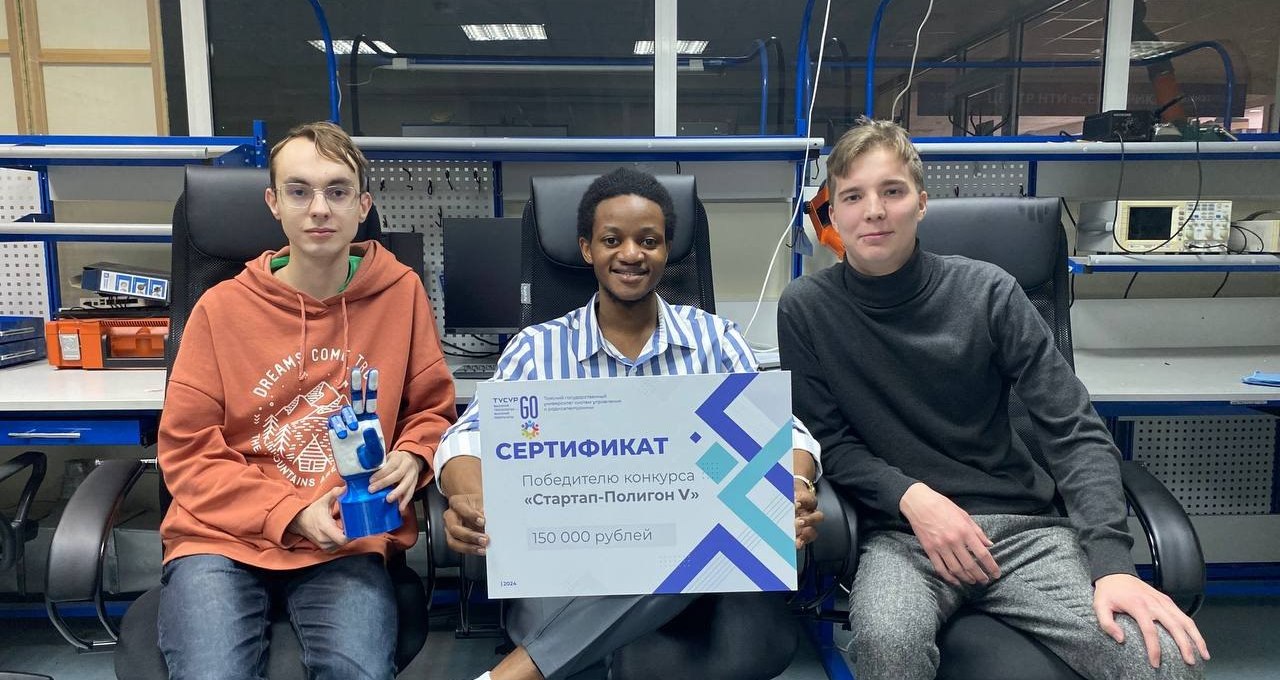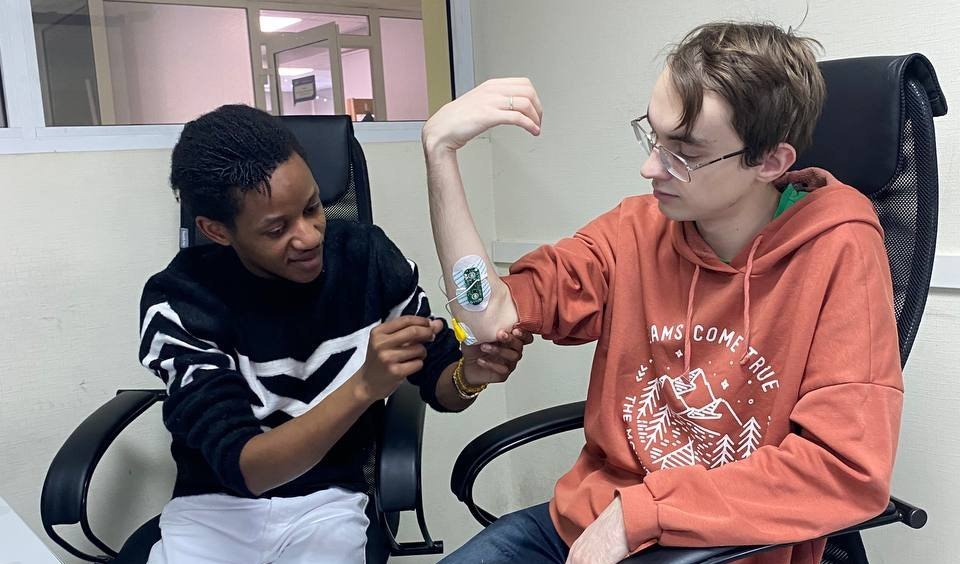
PhD Student from IEM TSU's Startup Could Slash the Cost of Next-Gen Prosthetics by Threefold
A team of young scientists from Tomsk State University (TSU) and Tomsk University of Control Systems and Radioelectronics (TUSUR University) is developing affordable and functional myoelectric and body-powered prostheses for upper limbs. The prostheses will be partially manufactured using 3D printing. Currently, imported bionic prostheses are unaffordable for most people, with prices ranging from 5 to 7 million rubles. The startup team's innovations will enable them to produce analogues of such prostheses for less than 1.3 million rubles. This will make modern prosthetics accessible both in Russia and abroad.
The line of functional prostheses for people with forearm and hand amputations, developed under the "InnoBionics" project, addresses the needs of both the Russian and international rehabilitation medicine markets.The "InnoBionics" project, led by Fiel Ngikofa, a PhD student at the Institute of Economics and Management (IEM) of TSU, was among the winners of the "Student Startup" competition and received a 1-million-ruble grant from the Foundation for Assistance to Innovation. Besides this project, 34 other business projects presented by TSU students and postgraduate students were winners in the 2025 competition. This constitutes more than a third of all winners in the Tomsk region, making TSU the leader in the number of victories in the "Student Startup" contest.
However, out of the more than 150,000 limb prostheses manufactured annually in Russia, a significant portion are inexpensive, technically simple devices. According to estimates by the Ministry of Labour, no more than 15% of patients are provided with modern bionic prostheses; the rest use basic mechanical models. Regarding imported devices, issues also arise with delivery times and maintenance.
As the project authors note, requirements for prostheses are increasingly high today. This is linked to the "rejuvenation" of the rehabilitation medicine market. Many patients lead active lifestyle due to their age and require more reliable, multifunctional devices. In response, government support programs are expanding.
Russian prosthetic and orthopedic enterprises are interested in modern domestic analogues capable of replacing foreign developments in terms of quality and reliability, while also meeting the parameters of state programs and tenders. Functional and easy-to-maintain prostheses are also in demand internationally.
ŌĆō The advantages and uniqueness of our product are its relatively affordable price, modular design, quick-change attachments, custom-fitted sockets, and local, fast service. All this enhances patients' quality of life and addresses key challenges in the rehabilitation market, says the startup's leader, Fiel Ngikofa, a PhD student at IEM TSU.

Fiel came to Russia from Namibia, he has been living and studying here for 7 years. He completed his bachelor's and master's degrees at Tomsk Polytechnic University and enrolled in a PhD program at Tomsk State University. The prototype of the multi-grip myoelectric forearm prosthesis was developed at the Tomsk business incubator "Druzhba" as part of Fiel's master's thesis. Now, using the grant from the Foundation for Assistance to Innovation, the startup team plans to refine this prototype into an MVP (Minimum Viable Product)ŌĆöa first version with the minimal necessary functionality to solve the user's key problem and gather feedback. Development will continue in a laboratory based at the "Druzhba" business incubator.
The product line will also include an advanced version of the myoelectric prosthesis with wireless biosignal transmission (the MVP for this version is partially funded by the grant) and a simpler, mechanical, multi-grip body-powered prosthesis. All models allow users to perform a wide range of daily living, professional, and sports tasks, improving their quality of life and promoting social integration.
The myoelectric prosthesis, besides a quick-detach universal hand with gripping fingers, features seven interchangeable attachments. These are designed for more complex tasks involving fine motor skills.
ŌĆō Using these attachments, a person can type, control a computer mouse, cut something with a knife, carefully pick up and hold small objects, and so on. However, these complex attachments may not work in all conditions; for example, they shouldn't be used for extended periods in freezing weather. Therefore, the prosthesis also has a less functional, 'simple hand' attachment ŌĆō useful for simply lifting and holding heavy objects or doing physical exercises like push-ups. This 'passive' attachment can withstand temperatures from -30┬░C to +70┬░C, explains Fiel Ngikofa.
The advanced version of the myoelectric prosthesis will feature a wireless biosignal transmission system using individual sensors. Integration of AI control is also a possibility for this model.
The mechanical(body-powered) prosthesis also comes with a set of multi-grip hands and attachments, and the absence of electronics makes it simple and highly reliable. This type of prosthesis is optimal for physically active, sporty users and those living in regions with underdeveloped infrastructure.
All products in the new prosthesis line will be characterized by light weight and easy replacement of components: thanks to the modular design, the prostheses do not require complete disassembly to change attachments, recharge the battery, or for local servicing or repairs.
ŌĆō Combining various production methods and materials for specific components, along with a number of innovations we can't yet disclose, allows us to bring prostheses to the market at three times cheaper than global analogues, adds Fiel Ngikofa. ŌĆō At the same time, they will comply with Russian state standards and interstate standards, meaning they can be purchased by charitable foundations and the Social Fund of Russia, which provides rehabilitation aids for people with disabilities.
The startup team aims to finalize the myoelectric prosthesis prototype by the end of next year. After that, it can be handed over to clinicians for research, followed by preparations for market launch.
Background Information
Since the inception of the "Student Startup" competition in 2022, students and young scientists from TSU have received over 100 million rubles from the Foundation for Assistance to Innovation to implement science-intensive startups and socially significant projects. On a national scale, their ideas consistently rank in the top-10 of all technological student startups in Russia annually.
The development of student entrepreneurship is facilitated by systematic work conducted by TSU, both for its own students and students from any other Russian universities. For instance, over the four years of their existence, TSU's acceleration programs have involved 2,800 students. During acceleration programs, with the consulting support of trackers and experts, they have created more than 450 startups.
Furthermore, the Center for Entrepreneurship operates at the Institute of Economics and Management (IEM) of TSU. Its staff helps students develop business skills and implement projects and startups in various fields. IEM pays particular attention to training technological entrepreneurs through its pilot master's program, "Creating a Technological Startup.ŌĆØ
Source:www.tsu.ru
